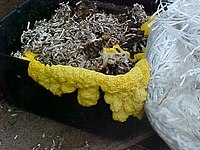
Photo from wikipedia
Methane is one of the most important greenhouse gases emitted from natural and human activities. It is scarcely soluble in water; thus, it has a low bioavailability for microorganisms able… Click to show full abstract
Methane is one of the most important greenhouse gases emitted from natural and human activities. It is scarcely soluble in water; thus, it has a low bioavailability for microorganisms able to degrade it. In this work, the capacity of the fungus Fusarium solani to improve the solubility of methane in water and to biodegrade methane was assayed. Experiments were performed in microcosms with vermiculite as solid support and mineral media, at temperatures between 20 and 35 °C and water activities between 0.9 and 0.95, using pure cultures of F. solani and a methanotrophic consortium (Methylomicrobium album and Methylocystis sp) as a control. Methane was the only carbon and energy source. Results indicate that using thermally inactivated biomass of F. solani, decreases the partition coefficient of methane in water up to two orders of magnitude. Moreover, F. solani can degrade methane, in fact at 35 °C and the highest water activity, the methane degradation rate attained by F. solani was 300 mg m-3 h-1, identical to the biodegradation rate achieved by the consortium of methanotrophic bacteria.
Journal Title: Chemosphere
Year Published: 2019
Link to full text (if available)
Share on Social Media: Sign Up to like & get
recommendations!